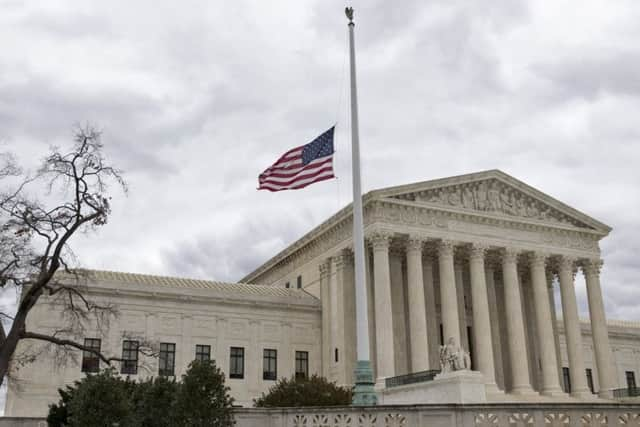Liam McMonagle: Scots v US legal systems '“ you be the judge


For lawyers, it also made many of us think about the differences between the US legal system and here.
One of the biggest differences is that most of the top judges in the US are household names. Scalia was well known and his death will have registered widely outside legal circles.


Advertisement
Hide AdAdvertisement
Hide AdIn Scotland, we have only just completed a process to appoint a new Lord President of the Court of Session and Lord Justice-General: two titles but one person; Scotland’s most senior judge. Lord Carloway, previously the Lord Justice-Clerk, was appointed. Did you know that?
One helpful feature of the Scottish judicial appointment system which could anonymise things further is that judges can adopt new titles when they assume office – like monarchs and Popes. So Lord Carloway was, before he became a judge, known as Colin Sutherland, QC.
Another difference is that judges in the US are assumed to be openly political appointments. The approval process – where the President’s Supreme Court nominees are grilled by the Senate at confirmation hearings – often involves judges being questioned on their views on policy matters or having their records in the lower courts or as practising lawyers scrutinised for indications of how they might side on key decisions. Some have tried to avoid or downplay this – notably Ruth Bader Ginsburg, a current Justice, who refused to answer many such questions during her own confirmation process.


It might be difficult to do that now, however, given how partisan and (to some eyes) bloody-minded Congress has become. However, it is almost certainly a factor presidents consider when nominating judges. While there is often consensus on technical, non-partisan legal matters (which actually make up most of the workload), in key cases the Supreme Court very often divides into two blocks representing the appointees of Republican or Democrat presidents respectively.
Here in Scotland, it’s considered exceptionally rude to suggest there might be anything political about what judges do. One of the highest-profile cases this year was the challenge to Alistair Carmichael’s election as MP for Orkney & Shetland. This was led by a group of constituents who had raised crowdfunding to bring a legal challenge – most of whom were SNP supporters. Perhaps unusually, much of it was televised. Yet any suggestion that the decision the Court was being asked to make was political, or could be coloured by any political preferences held by the judges, was minimal. (There was some, if you looked closely enough.)
The only real exception to this is the Human Rights Act. Successive politicians, in Westminster and Holyrood, have expressed frustration and dismay at the willingness of judges to find the actions of public authorities and individual ministers in contravention of the Act. It’s hard to argue that there is not a strong political element to much of the decision-making and application of human rights principles formulated in the post-war era to modern situations.
This could be one reason why the Scottish judiciary has perhaps been notably more reluctant than their English and Supreme Court counterparts to venture there in recent years. Indeed, if Justice Scalia’s “originalist” jurisprudence – ie, read the words on the page and apply them as they were meant at the time – had been followed in this area many of the current Conservative government’s objections to the Human Rights Act probably wouldn’t exist.
Would we be better off? Personally, I doubt it – but I bet you won’t hear that from a judge any time soon.
• Liam McMonagle is a partner in technology, media and entertainment at law firm Thorntons
